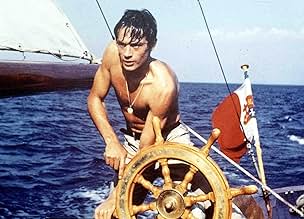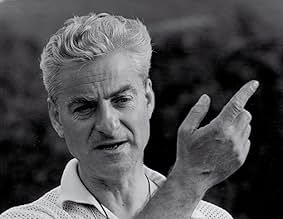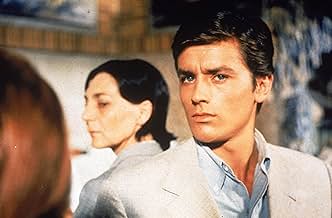VALUTAZIONE IMDb
7,7/10
22.770
LA TUA VALUTAZIONE
Tom Ripley è un imitatore, un falsario e un criminale di talento. Ma è più di tutto questo, anche se non lo sa.Tom Ripley è un imitatore, un falsario e un criminale di talento. Ma è più di tutto questo, anche se non lo sa.Tom Ripley è un imitatore, un falsario e un criminale di talento. Ma è più di tutto questo, anche se non lo sa.
- Regia
- Sceneggiatura
- Star
- Premi
- 1 vittoria in totale
Marie Laforêt
- Marge Duval
- (as Marie Laforet)
Billy Kearns
- Freddy Miles
- (as Bill Kearns)
René Clément
- Le serveur maladroit
- (non citato nei titoli originali)
Walter Grant
- Bit
- (non citato nei titoli originali)
Paul Muller
- Blind Man
- (non citato nei titoli originali)
Jacqueline Parey
- Ingrid
- (non citato nei titoli originali)
Romy Schneider
- Freddy's companion
- (non citato nei titoli originali)
Recensioni in evidenza
I'm fascinated by a scene at a restaurant. We get an extreme close-up of a woman who is kept out of focus while another character in the background, who is speaking and is in the center of the shot, remains in focus. Is the woman who is out of focus important or not? More to the point, was shooting it this way a good idea? It illustrates by contrast how sure-footed René Clément is most of the time. Usually there can be no debate.
I wasn't familiar with Clément's work until this film, but my God, he's good. His camera is always in some unexpected place that enhances the drama and tightens the suspense. He shares that talent with Orson Welles (meaning the Welles of "Citizen Kane" and "The Magnificent Ambersons," not, say, "Lady from Shanghai"), who also made decisions that are surprising yet invariably right.
Tom Ripley (Alain Delon) and Phillipe Greenleaf (Maurice Ronet) are lately inseparable friends. They're both idling in Europe, but on papa Greenleaf's dime. Phillipe's fiancée Marge (Marie Laforêt) feels sorry for Tom but resents his presence. Phillipe's other friend, Freddie (Billy Kearns), considers Tom Ripley a worthless moocher. But there's more to Tom Ripley, the mimic, the forger, the talented criminal improviser, than anyone, even Tom Ripley himself, can guess.
Alain Delon, with his chiseled looks and cold beauty, makes an excellent Tom Ripley. The script is brilliantly adapted from Patricia Highsmith's terrific suspense novel, "The Talented Mr. Ripley": the dialogue is always bringing the themes of duplicity, love, self-love, the nature of identity, ruthlessness and murder to the surface where they are given a brilliant sheen by Clément and his cinematographer Henri Decaë.
We're left to figure things out for ourselves, which is rare. Do we need to be told what Tom thinks of when he sees all those dead fish? When a door with a mirror swings open toward Tom, do we need to see Tom's mirror image to understand the mirror's significance? Or is it enough that we know there's a mirror next to Tom? I know what the answers would have been in Hollywood—in 1960 and now. Here, the answers are no, no and yes.
I wasn't familiar with Clément's work until this film, but my God, he's good. His camera is always in some unexpected place that enhances the drama and tightens the suspense. He shares that talent with Orson Welles (meaning the Welles of "Citizen Kane" and "The Magnificent Ambersons," not, say, "Lady from Shanghai"), who also made decisions that are surprising yet invariably right.
Tom Ripley (Alain Delon) and Phillipe Greenleaf (Maurice Ronet) are lately inseparable friends. They're both idling in Europe, but on papa Greenleaf's dime. Phillipe's fiancée Marge (Marie Laforêt) feels sorry for Tom but resents his presence. Phillipe's other friend, Freddie (Billy Kearns), considers Tom Ripley a worthless moocher. But there's more to Tom Ripley, the mimic, the forger, the talented criminal improviser, than anyone, even Tom Ripley himself, can guess.
Alain Delon, with his chiseled looks and cold beauty, makes an excellent Tom Ripley. The script is brilliantly adapted from Patricia Highsmith's terrific suspense novel, "The Talented Mr. Ripley": the dialogue is always bringing the themes of duplicity, love, self-love, the nature of identity, ruthlessness and murder to the surface where they are given a brilliant sheen by Clément and his cinematographer Henri Decaë.
We're left to figure things out for ourselves, which is rare. Do we need to be told what Tom thinks of when he sees all those dead fish? When a door with a mirror swings open toward Tom, do we need to see Tom's mirror image to understand the mirror's significance? Or is it enough that we know there's a mirror next to Tom? I know what the answers would have been in Hollywood—in 1960 and now. Here, the answers are no, no and yes.
Visually, this film could serve as a cinematic poster for a Mediterranean cruise. Cinematographer Henri Decae draws us into the film with its alluring Italian locales and gorgeous panoramic vistas. Bright, complementary hues and high color contrast translate into eye-popping reds and yellows. And, of course, there's the deep blue color of the sea, and a brilliant sunlit sky. Such is the setting for a story wherein three attractive, young adults (Tom, Philippe, and Marge) test a 3-way relationship that is far more complex than it first appears.
Indeed, trouble lurks beneath the surface (so to speak), in this "Italiano paradiso" thriller. In the first forty minutes, the psychological motivations of our three beautiful people are unclear and subject to change. It's hard to tell who is doing what to whom. Subsequent to this narrative setup, we see exactly where the story is headed. Because "Plein Soleil" is a psychodrama, casting is important. The three leads (Alain Delon, Maurice Ronet, and Marie Laforet) are all convincing in their roles.
I have not read the Highsmith novel on which the screenplay was based. So I cannot make an intertextual analysis. I do think this 1960 film is superior, for various reasons, to the more recent remake.
Adroitly directed by Rene Clement, with a buoyant musical score by Nino Rota, "Plein Soleil" is a character study of an amoral pleasure seeker whose charming personality masks the evil within. The juxtaposition of inwardly criminal intent with outwardly idyllic scenes of Italy and the Mediterranean results is an art house film that is both picturesque and suspenseful. It's a film that appeals both to our eyes and to our brains.
Indeed, trouble lurks beneath the surface (so to speak), in this "Italiano paradiso" thriller. In the first forty minutes, the psychological motivations of our three beautiful people are unclear and subject to change. It's hard to tell who is doing what to whom. Subsequent to this narrative setup, we see exactly where the story is headed. Because "Plein Soleil" is a psychodrama, casting is important. The three leads (Alain Delon, Maurice Ronet, and Marie Laforet) are all convincing in their roles.
I have not read the Highsmith novel on which the screenplay was based. So I cannot make an intertextual analysis. I do think this 1960 film is superior, for various reasons, to the more recent remake.
Adroitly directed by Rene Clement, with a buoyant musical score by Nino Rota, "Plein Soleil" is a character study of an amoral pleasure seeker whose charming personality masks the evil within. The juxtaposition of inwardly criminal intent with outwardly idyllic scenes of Italy and the Mediterranean results is an art house film that is both picturesque and suspenseful. It's a film that appeals both to our eyes and to our brains.
Extremely well done, tightly edited, well acted (by everyone, including the small roles, especially the actor who has to appear dead with long camera shots in a tense scene in the hotel). Delon is perfectly cast, with his calculating cool.
The cinematography is gorgeous, especially the scenes on the yacht---nothing gimmicky, but shot with an expertise that gives true drama to the action. You can feel the waves, the wind, and the sun. The colors are vibrant on the DVD. Though a scene like this in a typical movie today would include a heavy ominous score, the director simply lets the sound of the wind create the tension. The score (by Nina Rota), in fact, is understated, unlike anything today. Even the opening credits have style.
The cinematography is gorgeous, especially the scenes on the yacht---nothing gimmicky, but shot with an expertise that gives true drama to the action. You can feel the waves, the wind, and the sun. The colors are vibrant on the DVD. Though a scene like this in a typical movie today would include a heavy ominous score, the director simply lets the sound of the wind create the tension. The score (by Nina Rota), in fact, is understated, unlike anything today. Even the opening credits have style.
Purple Noon wasn't the first film Alain Delon starred in, but it was the one that made him a star. Purple Noon is an autopsy of a near-perfect crime, and a compelling look at the man who commits it. One of Purple Noon's most obvious assets is Delon's acting. Tom is fascinating because Delon makes him so. This isn't a run-of-the-mill villain; he's a complex character with a well thought-out reason for everything he does. In addition to Delon's fine performance, Purple Noon is characterized by expert camerawork and crisp direction. Clement understands how to sustain tension without drawing it out too far. The film is exactly the right length, as are each of the individual scenes. There's nothing so engrossing as watching a truly intelligent thriller, and that makes this film a rare treat. If you enjoy atmospheric high intelligence content and aren't put off by subtitles, then you can't spend a better hour and a half than watching this movie.
Alain Delon and Maurice Ronnet play a fascinating duet of savage cruelty in this tense beautifully crafted Rene Clement thriller from Patricia Highsmith's pen. Anthony Minghella remade it as "The Talented Mr Ripley" with a more polished script and some startling character development but "Purple Noon" has an unbeatable extra gear in Alain Delon's portrayal. He is deadly because anyone would have fallen into his trap. His beauty is inviting and reassuring. We witness his brutal side but don't get to the point of judging him. That is more unique than rare in a movie. Delon's Ripley acts as if there was nothing objectionable about his behavior. A poster boy for amorality. Marie Laforet's Marge is stunningly beautiful but don't get to know her as well as we do Gyneth Paltrow in Minghella's version. If you liked The Talented Mr Ripley" you're going to love "Purple Noon" and vice-versa.
Alain Delon's Top 10 Films, Ranked
Alain Delon's Top 10 Films, Ranked
To celebrate the life and career of Alain Delon, the actor often credited with starring in some of the greatest European films of the 1960s and '70s, we rounded up his top 10 movies, ranked by IMDb fan ratings.
Lo sapevi?
- QuizAlain Delon's then girlfriend Romy Schneider appears in the very first scene as a friend of Freddie Miles.
- BlooperOnlookers are clearly visible in the background in the fish market scene.
- Citazioni
Philippe Greenleaf: That's why you took my bank statements?
Tom Ripley: Exactly.
Philippe Greenleaf: So you kill me and you're rich?
Tom Ripley: Don't miss a trick, do you?
Philippe Greenleaf: It seems awfully complicated. You'd be caught immediately.
Tom Ripley: No necessarily. I might not look it, but I've got lots of imagination.
- ConnessioniEdited into Spisok korabley (2008)
I più visti
Accedi per valutare e creare un elenco di titoli salvati per ottenere consigli personalizzati
- How long is Purple Noon?Powered by Alexa
Dettagli
- Data di uscita
- Paesi di origine
- Lingue
- Celebre anche come
- In pieno sole
- Luoghi delle riprese
- Ischia Ponte, Ischia Island, Napoli, Campania, Italia(as Mongibello)
- Aziende produttrici
- Vedi altri crediti dell’azienda su IMDbPro
Botteghino
- Lordo in tutto il mondo
- 108.821 USD
- Tempo di esecuzione1 ora 58 minuti
- Proporzioni
- 1.66 : 1
Contribuisci a questa pagina
Suggerisci una modifica o aggiungi i contenuti mancanti


![Guarda Trailer [English SUB]](https://m.media-amazon.com/images/M/MV5BYzkzMWVkMmEtM2I3Zi00MjE2LTkxZGYtZDYxMDFmMjBmMzM5XkEyXkFqcGdeQXRyYW5zY29kZS13b3JrZmxvdw@@._V1_QL75_UX500_CR0)































